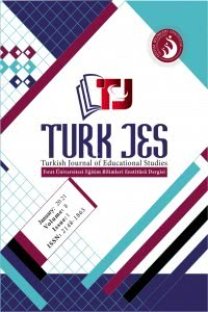Öğretmenlerin Eğitim İnançları İle Öğrenen Özerkliğini Destekleme Davranışları Arasındaki İlişki
Bu araştırmada, ilkokul, ortaokul ve lise öğretmenlerinin eğitim inançları ile öğrenen özerkliğini destekleme davranışları arasındaki ilişkinin belirlenmesi amaçlanmıştır. Araştırma tarama modelinde desenlenmiştir. Araştırmanın örneklemini Sandıklı ilçesinde görev yapan öğretmenler oluşturmaktadır. Örneklemin belirlenmesinde oransız küme örneklemesi tekniği kullanılmıştır. Buna göre 93 ilkokul, 77 ortaokul ve 78 lise öğretmeni olmak üzere 248 öğretmenden veri toplanmıştır. Araştırmada veri toplama aracı olarak “Eğitim İnançları Ölçeği (EİÖ)” ve “Öğrenen Özerkliğini Destekleme Ölçeği (ÖÖDÖ)” kullanılmıştır. Verilerin çözümlenmesinde betimsel istatistikler, t-testi, ANOVA ve korelasyon analizleri kullanılmıştır. Araştırma sonuçlarına göre, öğretmenlerin eğitim inançlarından en yüksek katılım gösterdiği boyutlar sırası ile varoluşçuluk, yeniden kurmacılık, ilerlemecilik, daimicilik ve esasicilik alt boyutlarıdır. Öğretmenler, öğrenen özerkliğini destekleme davranışlarını yüksek düzeyde gerekli bulmakta, ancak bu davranışları orta düzeye yakın sergilemektedir. Öğretmenler, özerklik desteği boyutları arasında en çok “Duygu ve Düşünce Desteğini” gerekli bulmakta ve sergilemektedir. Bu boyutu sırası ile “Öğrenme Süreci Desteği” ve “Değerlendirme Desteği” boyutları izlemektedir. Araştırmadan elde edilen bulgular, öğretmenlerin eğitim inançları ile öğrenen özerkliğini destekleme davranışları arasında anlamlı ilişkiler olduğunu ortaya koymaktadır.
Anahtar Kelimeler:
Eğitim İnançları, Eğitim Felsefesi, Öğrenen Özerkliği, Özerklik Desteği
The Relationship between Educational Beliefs and Learner Autonomy Support Behaviors of Teachers
The purpose of this study is to determine the relationship between educational beliefs and learner autonomy support behaviors of primary, secondary and high school teachers. A survey research method was employed this study. The sample of the study consisted of teachers who work in the Sandıklı district. The disproportionate cluster sampling technique was used in determining the sample. Accordingly, the data was collected from 248 teachers including 93 primary school teachers, 77 secondary school teachers and 78 high school teachers. In the study "Education Belief Scale (EBS)" and "Learner Autonomy Support Scale (LASS)" were used as the data collection tools. To analyze the data, descriptive statistics, t-test, ANOVA and correlation analysis were used. According to the research results, the dimensions of educational beliefs of teachers which teachers showed the highest attendance are existentialism, re-constructionism, progressivism, perennialism, and essentialism sub-dimensions respectively. Teachers found the learner autonomy support behaviors are required in high level and to exhibit these behaviors is close to the middle level. Teachers find thoughts and feelings are most required among the autonomy support dimensions and exhibit them. This dimension is followed by the learning process support and the assessment support dimensions respectively. The findings obtained from the research show that there is a significant relationship between educational beliefs and learner autonomy support behaviors of teachers.
- ISSN: 2458-8210
- Başlangıç: 2014
- Yayıncı: Fırat Üniversitesi
Sayıdaki Diğer Makaleler
Okul Yöneticilerinin Seçilme ve Atanma Kriterlerine İlişkin Öğretmen Görüşlerinin Değerlendirilmesi
Mukadder BOYDAK ÖZAN, Mutlu GAVCAR, Fatih SAÇAKLI, Nihat ŞAHİN
Öğretmenlerin Eğitim İnançları İle Öğrenen Özerkliğini Destekleme Davranışları Arasındaki İlişki
Aytunga OĞUZ, Yahya ALTINKURT, Kürşad YILMAZ, Sebahat HATİPOĞLU
ÖGRENJİLERDE BİRİKİM BİLGİSİNİN OLUŞMASI SÜREJİNİN ARAŞTIRILMASI METODİĞİNİN BAZİ YÖNLERİ
